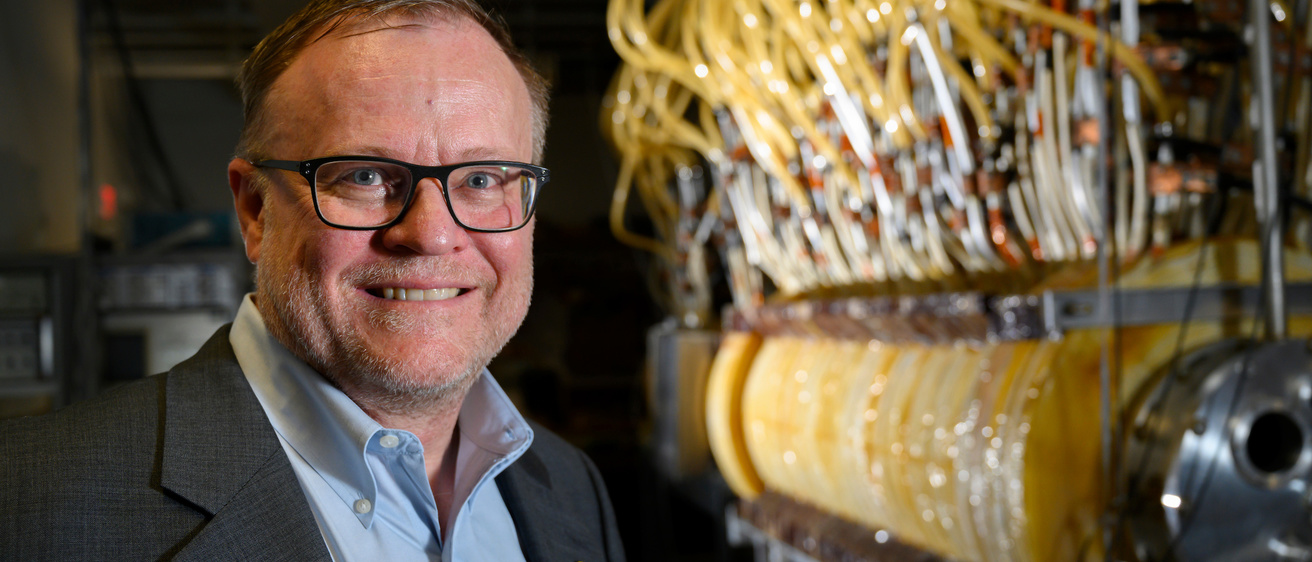Earlier this month, the Office of the Vice President for Research hosted state legislators on a tour of some of the University of Iowa’s leading-edge research and scholarship activities.

We visited the labs of two space science superstars: Craig Kletzing, whose team recently won a $115 million grant from NASA to study the powerful interactions between the magnetic fields of the sun and Earth, and David Miles, who has built a furnace that can heat objects to more than 2,900 degrees Fahrenheit—hotter than lava—to manufacture a critical space-instrument component that is in desperately short supply in the United States.
We tried out a virtual reality walking simulator in the Human Performance and Clinical Outcomes lab in the Roy J. and Lucille A. Carver College of Medicine’s (CCOM) Department of Physical Therapy and Rehabilitation Science. There, lab founder Jason Wilken and his collaborators—Joseph Buckwalter IV, Arthur Steindler Chair of Orthopaedic Surgery in CCOM; Barbara Rakel, professor in the College of Nursing; and James Marchman, professor emeritus in the College of Liberal Arts and Sciences Department of Psychological and Brain Sciences—shared how they’re leveraging Department of Defense and National Institutes of Health funding to improve orthotics for soldiers wounded in battle and help them recover from their injuries without becoming addicted to opioids.
Legislators learned how the University of Iowa also is working to improve agriculture. In fact, a team led by Jun Wang, professor of chemical and biochemical engineering, is partnering with Iowa State University on a U.S. Department of Agriculture grant (with additional seed-grant support from UI and ISU) to develop inexpensive sensors and advanced weather prediction models that support precision agriculture. And we learned how Ned Bowden in the Department of Chemistry, Erin Irish in the Department of Biology, and Aliasger Salem, Bighley Chair and Professor of Pharmaceutical Sciences and Head of the Division of Pharmaceutics and Translational Therapeutics in the College of Pharmacy, are developing a super-fertilizer expected to significantly boost the harvest yields of corn and soybeans, helping farmers in Iowa and beyond, thanks to funding from the National Science Foundation.
Legislators also heard presentations by four gifted undergraduate students working in the labs of these and other faculty, with support from the Iowa Center for Research by Undergraduates (ICRU): geology student Tori Cassady, physics and astronomy student Hannah Gulick, biomedical engineering student Olivia Powers, and mechanical engineering student Anvay Pradhan.
We are fortunate to have opportunities to boast about the great research and scholarship taking place on our campus, and I’m proud to helm an office that works to support those activities by helping secure funding, ensure safety, and translate inventions into commercially viable medical devices, treatments, and other products and services. In fiscal year 2019, through our collective efforts across campus, the UI secured record dollars for research and scholarship: $466.9 million, to be exact.
But I’m a chemist by training and had the good fortune, like our four young presenters during the legislative tour, to be invited into a lab and receive mentoring as an undergraduate student. So for me, the greatest thrill of working on a campus like the University of Iowa is seeing firsthand the curiosity and enthusiasm driving faculty, staff, and students to ask urgent and important questions about our world, whether they’re in their first year or are seasoned investigators.
I’m still relatively new to campus, so I’m still listening and learning. But I can tell you that our office is committed to doing all it can to keep the flame burning bright: by making the process of securing funding and ensuring safety as efficient as possible, by spurring collaboration through our many events and training opportunities throughout the year (like Creative Matters, Science on Tap, and our various grant training workshops), and by helping more of our youngest researchers and scholars find mentored and meaningful experiences in our labs, libraries, and out in the field.
When I welcomed our legislative visitors a couple weeks ago, I told them I had just one goal for them that day: to leave knowing just one new thing about how the university is working to create knowledge that benefits Iowans and the world. Based on my conversations with them, they left understanding our world class faculty is addressing the urgent issues of our time and educating the leaders of tomorrow.
